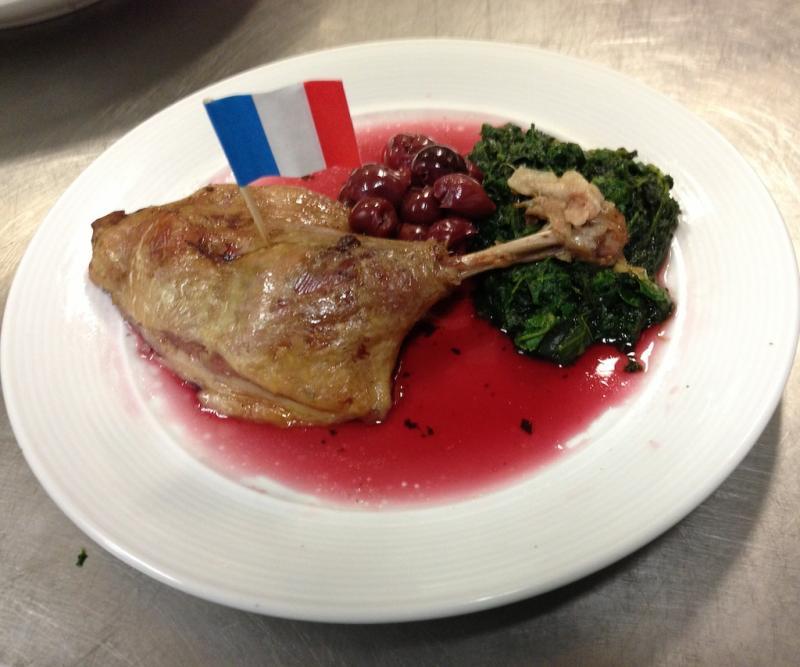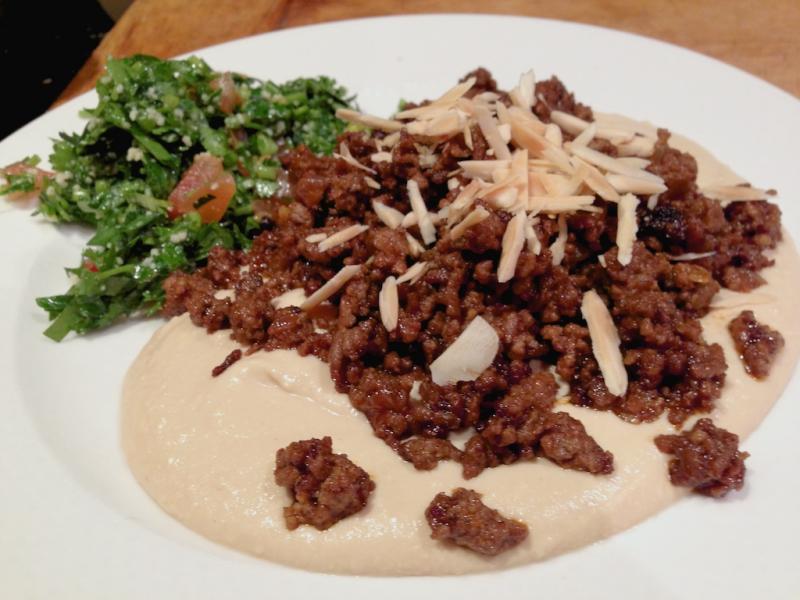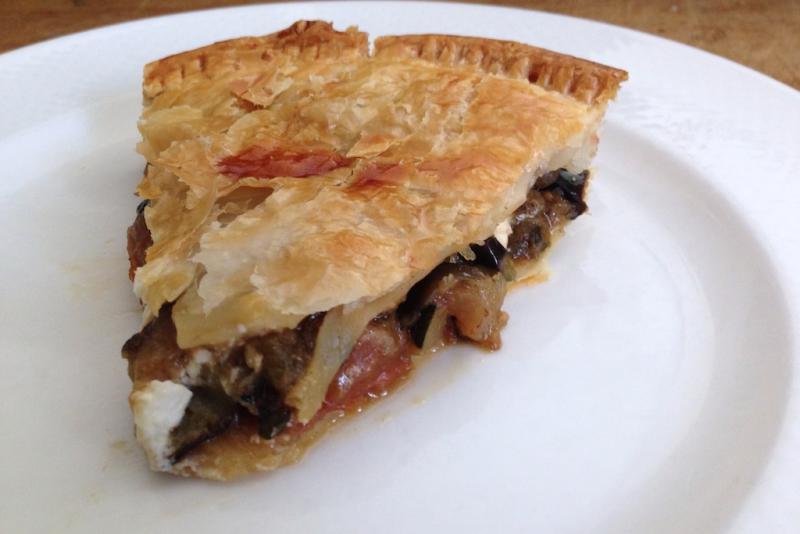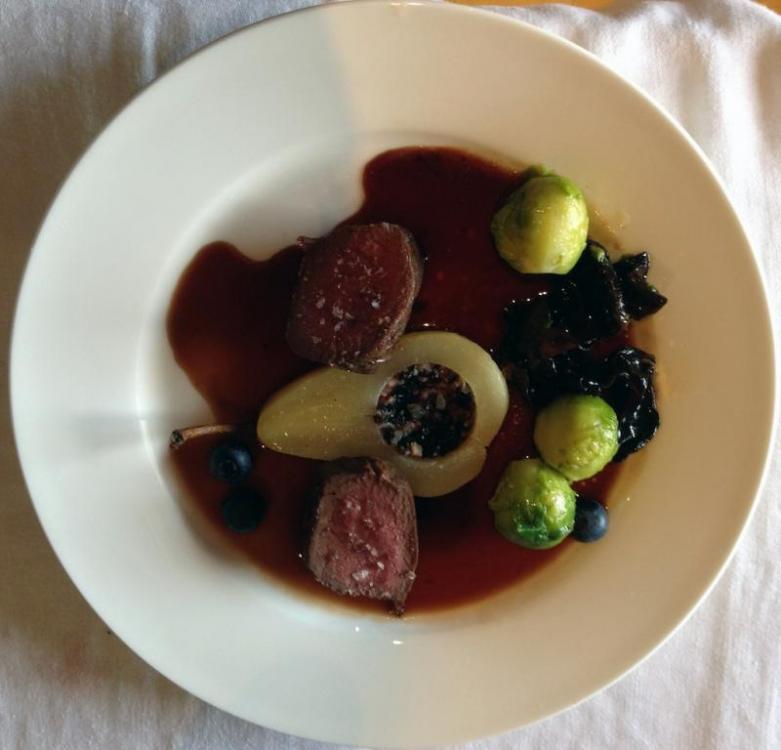-
Posts
2,606 -
Joined
-
Last visited
Content Type
Profiles
Forums
Store
Help Articles
Everything posted by nickrey
-
Bastille day celebration at my wine and food society. Duck confit for 50. Duck fat roasted smashed potatoes served separately.
-
Middle Eastern tonight. Hummus with spicy lamb and tabbouleh garnished with roasted slivered almonds.
-
This point would be valid if you were dipping the pasta in though the oil layer as you dip the objects through the layer in the process you describe. If you watch pasta cooking in vigorously boiling water, it rolls around below the water. The oil is floating on top of the water. I still can't see physically how the oil would get onto or into the pasta.
-
How much water do you use relative to the amount of pasta? Too little and it's likely to stick. Make sure the water is at a rolling boil before putting pasta in. Don't bother about the nonsense of putting olive oil in the water while cooking. It simply floats on the top. Straight after draining, however, you could toss some through. Agree with other comments about adding it to the sauce quickly. Also, you could hang the fresh pasta to let it dry a bit before cooking.
-
Second The Professional Chef. It also has introductory chapters on how scale, cost, calculate yield, etc that are all useful for cooking for crowds within a budget.
-
Duck confit. Cure overnight in salt, with added garlic, bay leaf, thyme, and peppercorns. Rinse off, bag with a bit of duck fat. Cook for 8 hours at 80C.
-
Polenta is a stirred dish. I'd treat it like risotto and use the butterfly. It is also stirred gently and continually so speed 3 would perhaps be better than speed 4. However, I went to a chef event in Sydney where Massimo Bottura from Osteria Francescana was giving a presentation. The chef whose kitchen he shared while in Australia commented that Bottura cooked his polenta on a surprisingly high speed in the Thermomix so this may be an alternative. Make sure you have enough liquid in there.
-
Green beans are often accompanied with toasted slithered almonds. They give texture without adding more flavour components. You've got enough flavours there already,
-
-
With the calcium chloride it probably won't take 18 hours. As Andiesenji said, it is likely homogenisation that is your problem. This blasts the fat particles into little bits and makes it really hard for them to knit together as curds; doubly so as it is goat's milk which doesn't form a curd anywhere near as easily as sheep or cow milk.
-
Thank you, nickrey. What an excellent & complete explanation. Now I actually understand the 'why' as well as know the 'what.' I like that.ETA one more question: If I use part of the mozzarella, then vacuum pack it with a little fresh/filtered water, will it keep longer, or is it 'on the clock' from the time it's first opened? My vacuum sealer is a FoodSaver. Hard one to answer. Personally I'd add some time. Making a recommendation to others, however, I'd say it's on the clock from when it's first opened as I don't know what HACCP you use. Things like touching it with your hands, putting it on unsterilised chopping boards, time out of refrigeration, etc are all potential sources of contamination once you take it out of the package.
-
Make sure you dissolve the calcium chloride in water before adding. I use a 32% solution. Good looking mozzarella.
-
It's interesting that many of the reported definitive works on a country are written by foreigners. It really depends what you are looking for. Broadbrush or in-depth, beginner or advanced? Most of these are not duplicates of ones mentioned earlier France: Alain Ducasse's "Grand Livre de Cuisine," "The Complete Bocuse," or "The Complete Robuchon" Spain: Joan Roca "Roots, Essential Catalan Cuisine" Colman Andrews "Catalan Cuisine" Some would say Italy: La Cucina Italiana "The Encyclopedia of Italian Cooking," "La Cucina, The Regional Cooking of Italy," or Hazan "The Classic Italian Cookbook" Germany: Dr Oetker "German Cooking Today" Greece: Vefa's Kitchen Russia: Darra Goldstein "A Taste of Russia" Morocco: Paula Wolfert "Complete Moroccan Cookbook" Eastern Mediterranean (Israel, Jordan, Syria): Claudia Roden, "New Book of Middle Eastern Food" India: Although a number have reviewed it less than positively, it aims to be comprehensive : Pushpesh Pant "India The Cookbook" Nepal: Jyoti Pathak "Taste of Nepal" Cambodia: Ghilie Basan "Food and Cooking of Cambodia" Laos: Phaya Sing "Traditional Recipes of Laos" Thailand: David Thompson "Thai Food" Vietnam: Less definitive but good: Andrea Nguyen "Into the Vietnamese Kitchen," Luke Nguyen "My Vietnam: Stories and Recipes" China: Pei-Mei's Chinese Cookbook (volumes 1, 2, and 3); Fuschia Dunlop: "Sichuan Cookery" and Hunanese ("Revolutionary Chinese Cookbook") Japan: Tsuji "Japanese Cooking A Simple Art" Korea: Chang Sun-Young "A Korean Mother's Cooking Notes" Mexico: Diana Kennedy "The Essential Cuisines of Mexico" Argentina: Seven Fires, mentioned above is excellent (see Latin America) Brazil: (see Latin America) Latin America: Marical E. Presilla "Gran Cocina Latina" South East Asia: Rosemary Brissenden "Southeast Asian Food" Indonesia: Sri Owen "Indonesian Food"
-

Food/Flavor pairing: Science? Luck? Geography?
nickrey replied to a topic in Food Traditions & Culture
Look at Flavornet, Volatile Compounds in Food Database. Also check www.thegoodscentscompany.com . Do a site search in Google for what you want to look for ( site:www.thegoodscentscompany.com [the foodstuff you want to search for]) -
Measure one kilogram of water, which is one liter. Then add 100-120g salt and the calcium chloride, if using (2.5g for this quantity of water). Bring it to the boil to bring salts into solution and to remove chlorine if there was any in the water. Let it cool then put feta into it.
-
I use kitchen scales, which also gets around the issue of measuring a product such as salt that can have different grain sizes.
-
Mozzarella is a cooked cheese that is heated to 80 degrees celsius before the curd is stretched. Feta only goes to around 32C to set off the culturing. It is then set with rennet and the curd is then cut, drained, and turned to give its texture. Feta is then brined and is designed to be kept in brine for extended periods. It will go soft if left in water because the calcium leaches out. Mozarella is a different class of cheese that will not fall apart if kept in water. Typically it is cryovaced or kept in simple cold water and is classified as a fresh cheese rather than a matured product. I'd be keeping mozzarella in fresh water and using it within a week to 10 days or by the manufacturers specified use by date.
-
If you put it in fresh water you are exposing it to spoiling bacteria. This is something that the salt in the brine will keep at bay. Water will also make the feta soft because of calcium exchange which is why the Greeks sometimes use milk to soak it in if they want to remove some of the salt and why I recommended adding calcium chloride to the brine.. The recommendations I gave are those found in cheese making texts. When I make feta, I use my vacuum packer with the brine to make it absolutely air tight and this seems to last a long time. I'd say this is similar in nature to the vacuum packed feta that you can buy from supermarkets. Freezing changes its texture but so does cooking it in Spanokopita or Moussaka so that is not really an issue for how you have used it. Feta is sometimes aged in brine and some Greek manufacturers age it in brine in wooden barrels, which gives a more complex flavour. Conservatively, I'd say keep it up to three months from time of production (I keep it for longer); however, as you don't know when it was produced, I'd use it within a month and then buy some more.
-
Keep it in a 10-12% salt brine. Use pure salt only (no anti-caking agents, uniodised). The water needs to be unchlorinated (you can boil normal water to achieve this and this is a good time to add the salt). To stop the cheese from going soft, add up to .25% calcium chloride. Make sure the cheese sits below the water level.
-
Beetroot dip. Chop them coarsely, add yoghurt to desired texture. Seasons with lemon juice, cumin, coriander, salt and pepper. Serve with toasted pita bread.
-
The wok in the video is a carbon steel wok that has been appropriately seasoned. It is worlds away from a supposedly non-stick wok, many of which shouldn't be used on the high heat that wok cooking requires anyway. If you have an Asian supplier somewhere close, you should be able to get one very cheaply. Look on the Internet on how to season a wok properly. Get a flat bottomed one for your range. Follow the process and you will have a real non-stick cooking utensil rather than a pretend one.
-
Yotam Ottolenghi's book Plenty is one of the best restaurant vegetarian cookbooks I've come across. The recipes are easily made at home.
-
-
That's basically what happens. The yolk goes like custard. The white is semi set. This is how a number of chefs, including Rene Redzepi at Noma separate out the egg yolks for their dishes. They wash away the white. At this point, I crack the eggs onto a plate and brush away the loose white. you'll know it when you see it. I then put the eggs into simmering water to harden the whites. It gives a fantastic egg-shaped poached egg.






